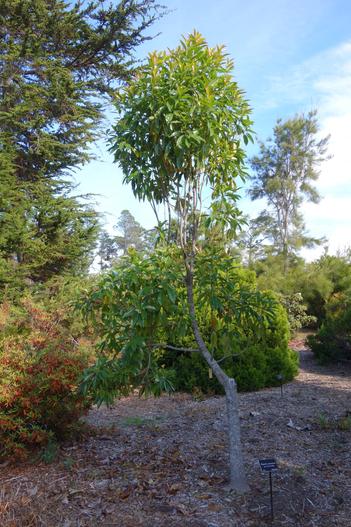Yunnan Magnolia
(Magnolia yunnanensis)
Yunnan Magnolia (Magnolia yunnanensis)
/
/

Daderot
CC0
Image By:
Daderot
Recorded By:
Copyright:
CC0
Copyright Notice:
Photo by: Daderot | License Type: CC0 | License URL: http://creativecommons.org/publicdomain/zero/1.0/deed.en | Uploader: Daderot | Publisher: Wikipedia Commons






Estimated Native Range
Summary
Magnolia yunnanensis, commonly known as Yunnan Magnolia, is an evergreen tree native to the subtropical montane forests and valleys of southern China, particularly in Yunnan province, and extending into parts of Indochina. It typically grows to a height of 20-30 feet (6-9 meters) with a similar spread, and is characterized by its upright, ’Gallery Pear-type’ growth habit. The tree’s foliage is exceptionally glossy and evergreen, providing year-round interest. Yunnan Magnolia produces creamy-white flowers that are smaller and less showy than those of some other magnolia species, but they nonetheless contribute to the tree’s ornamental appeal, blooming sporadically throughout the year with a peak in the spring season.
Yunnan Magnolia is valued for its attractive, dense foliage and is often used as a street tree or in urban landscaping in its native region. It is also suitable for use as a specimen tree or in mixed borders in gardens. This species prefers well-drained, acidic to neutral soils and can tolerate partial shade, though it thrives in full sun. While it is relatively low-maintenance, it may require protection from strong winds and is not tolerant of drought. There are no widely recognized cultivars of this species in the horticultural trade, and it is generally free from serious pests and diseases. However, it may be susceptible to leaf spot and canker in poor growing conditions. It is not known to be invasive when grown outside its native range.CC BY-SA 4.0
Yunnan Magnolia is valued for its attractive, dense foliage and is often used as a street tree or in urban landscaping in its native region. It is also suitable for use as a specimen tree or in mixed borders in gardens. This species prefers well-drained, acidic to neutral soils and can tolerate partial shade, though it thrives in full sun. While it is relatively low-maintenance, it may require protection from strong winds and is not tolerant of drought. There are no widely recognized cultivars of this species in the horticultural trade, and it is generally free from serious pests and diseases. However, it may be susceptible to leaf spot and canker in poor growing conditions. It is not known to be invasive when grown outside its native range.CC BY-SA 4.0
Plant Description
- Plant Type: Tree
- Height: 10-25 feet
- Width: 8-15 feet
- Growth Rate: Moderate
- Flower Color: White
- Flowering Season: Spring
- Leaf Retention: Evergreen
Growth Requirements
- Sun: Full Sun, Part Shade
- Water: Medium
- Drainage: Medium, Slow
Common Uses
Border Plant, Fragrant, Hedges, Low Maintenance, Potted Plant, Showy Flowers
Natural Habitat
Native to subtropical montane forests and valleys of southern China and parts of Indochina
Other Names
Common Names:
Scientific Names: , Magnolia yunnanensis, Magnolia nitida var. robusta, Pachylarnax yunnanensis, Pachylarnax yunnanensis var. robusta, Parakmeria robusta, Parakmeria yunnanensis,
GBIF Accepted Name: